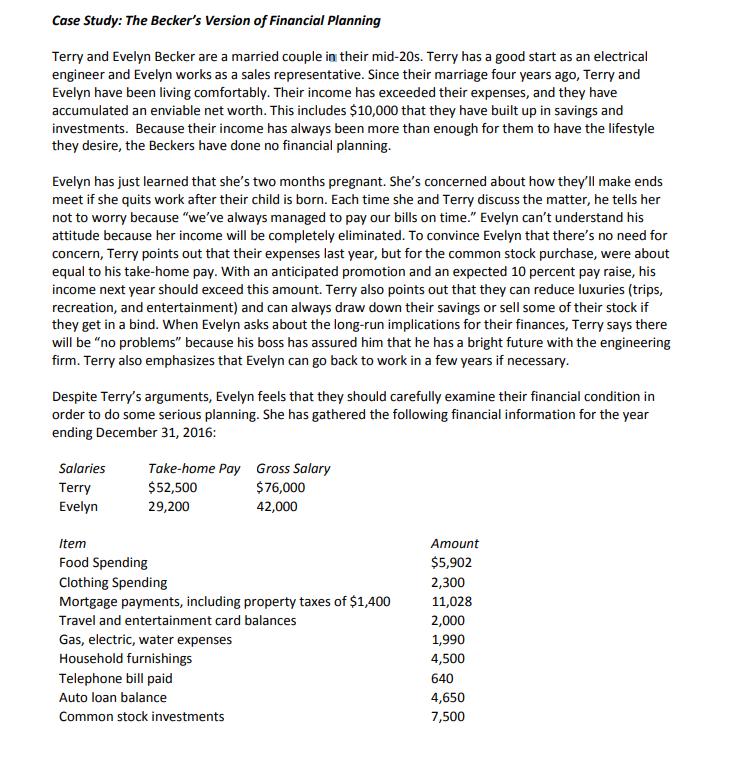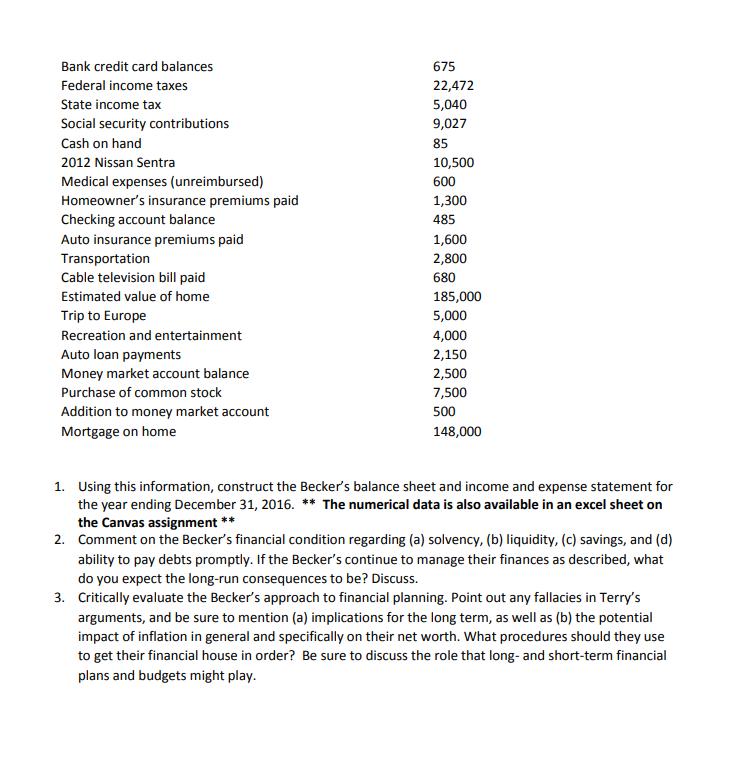Answered step by step
Verified Expert Solution
Question
1 Approved Answer
Case Study: The Becker's Version of Financial Planning Terry and Evelyn Becker are a married couple in their mid-20s. Terry has a good start


Case Study: The Becker's Version of Financial Planning Terry and Evelyn Becker are a married couple in their mid-20s. Terry has a good start as an electrical engineer and Evelyn works as a sales representative. Since their marriage four years ago, Terry and Evelyn have been living comfortably. Their income has exceeded their expenses, and they have accumulated an enviable net worth. This includes $10,000 that they have built up in savings and investments. Because their income has always been more than enough for them to have the lifestyle they desire, the Beckers have done no financial planning. Evelyn has just learned that she's two months pregnant. She's concerned about how they'll make ends meet if she quits work after their child is born. Each time she and Terry discuss the matter, he tells her not to worry because "we've always managed to pay our bills on time." Evelyn can't understand his attitude because her income will be completely eliminated. To convince Evelyn that there's no need for concern, Terry points out that their expenses last year, but for the common stock purchase, were about equal to his take-home pay. With an anticipated promotion and an expected 10 percent pay raise, his income next year should exceed this amount. Terry also points out that they can reduce luxuries (trips, recreation, and entertainment) and can always draw down their savings or sell some of their stock if they get in a bind. When Evelyn asks about the long-run implications for their finances, Terry says there will be "no problems" because his boss has assured him that he has a bright future with the engineering firm. Terry also emphasizes that Evelyn can go back to work in a few years if necessary. Despite Terry's arguments, Evelyn feels that they should carefully examine their financial condition in order to do some serious planning. She has gathered the following financial information for the year ending December 31, 2016: Salaries Take-home Pay Gross Salary $52,500 Terry $76,000 Evelyn 29,200 42,000 Item Aount Food Spending Clothing Spending Mortgage payments, including property taxes of $1,400 $5,902 2,300 11,028 Travel and entertainment card balances 2,000 Gas, electric, water expenses Household furnishings 1,990 4,500 Telephone bill paid 640 Auto loan balance 4,650 Common stock investments 7,500 Bank credit card balances 675 Federal income taxes 22,472 State income tax 5,040 Social security contributions 9,027 Cash on hand 85 2012 Nissan Sentra 10,500 Medical expenses (unreimbursed) Homeowner's insurance premiums paid 600 1,300 Checking account balance 485 Auto insurance premiums paid 1,600 Transportation 2,800 Cable television bill paid 680 Estimated value of home 185,000 Trip to Europe 5,000 Recreation and entertainment 4,000 Auto loan payments Money market account balance 2,150 2,500 Purchase of common stock 7,500 Addition to money market account 500 Mortgage on home 148,000 1. Using this information, construct the Becker's balance sheet and income and expense statement for the year ending December 31, 2016. ** The numerical data is also available in an excel sheet on the Canvas assignment ** 2. Comment on the Becker's financial condition regarding (a) solvency, (b) liquidity, (c) savings, and (d) ability to pay debts promptly. If the Becker's continue to manage their finances as described, what do you expect the long-run consequences to be? Discuss. 3. Critically evaluate the Becker's approach to financial planning. Point out any fallacies in Terry's arguments, and be sure to mention (a) implications for the long term, as well as (b) the potential impact of inflation in general and specifically on their net worth. What procedures should they use to get their financial house in order? Be sure to discuss the role that long- and short-term financial plans and budgets might play.
Step by Step Solution
★★★★★
3.55 Rating (152 Votes )
There are 3 Steps involved in it
Step: 1
BALANCE SHEET ASSETS A Cash on hand 85 B Checking account balance 485 C Money market account balance 3000 2500500 D Common stock 15000 75007500 EABCD ...
Get Instant Access to Expert-Tailored Solutions
See step-by-step solutions with expert insights and AI powered tools for academic success
Step: 2

Step: 3

Ace Your Homework with AI
Get the answers you need in no time with our AI-driven, step-by-step assistance
Get Started


